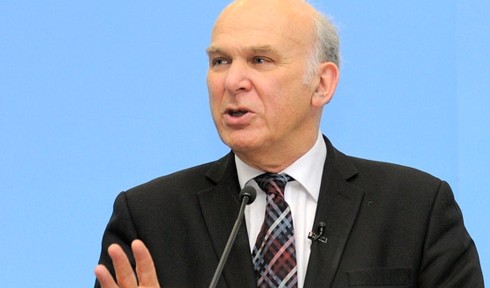Tim Breedon will be supported by a panel of experts drawn from the business and finance community, who will examine the challenges facing businesses in diversifying their finance. The focus will be on debt and credit products, looking at a range of finance choices, old and new, from corporate bonds to ‘crowd-funding’.
Business Secretary Vince Cable said: “Businesses across the UK are still in many cases unhappy with the way they have been treated by banks.
“We have secured a rise in new lending from the biggest banks this year and credit easing is designed to provide another immediate boost. But I want to see as much competition in the market as possible and for businesses to have access to a wide range of finance sources.
“There are exciting innovations emerging that provide alternatives to bank lending. Businesses are selling bonds directly to their customers, missing out the middle-men. And peer-to-peer lending has opened up opportunities for savers to invest directly in the fortunes of UK businesses. I want to investigate and dismantle any barriers to these and future innovations.
“Tim Breedon is a highly capable and well-respected figure in finance and I look forward to working with him in the coming months as he takes forward this important work.”
The Taskforce was announced as part of the credit easing package in the Autumn Statement. It will report to Government ahead of the 2012 Budget statement.
UK businesses have been heavily reliant on banks to raise finance. The majority of smaller and mid-sized businesses rely solely on bank loans to raise finance. Only around 10% of these businesses seek asset-based finance and fewer than 5% choose bond or mezzanine finance.
The Taskforce will work with businesses, lenders, investors and providers of alternative finance to examine structural and behavioural barriers to raising non-bank finance. It will set out what steps are needed to ensure businesses can access a wider range of alternative finance sources.
Mark Hoban, Financial Secretary to the Treasury commented:
“We are committed to broadening the range of sources of finance for SMEs and mid-sized businesses, and I am grateful that Tim Breedon has agreed to bring his broad financial experience to this important task. The work of this group will complement the credit easing package announced in the Autumn Statement.”
Taskforce Chairman Tim Breedon said: “As banking reforms progress, it is vital for the UK economy that the flow of credit to businesses is maintained. Non-bank finance is likely to make an increasingly important contribution, so we need to develop alternatives that work for firms and help them deliver growth in the broader economy.”
CBI Director-General John Cridland said: “Government has grasped the nettle in supporting industry to develop new and viable financing solutions for small and medium sized companies. There is huge growth potential in the UK’s medium sized businesses, ready to be unlocked if we can provide them with long term capital to support their investment.
“The taskforce initiative is something that the CBI has specifically called for and it is an opportunity to tackle the barriers that prevent most mid-sized businesses from looking beyond their bank for financial support.
“The current constraints on bank lending mean there is an urgent need to find alternative sources of capital suitable for growing businesses.”
John Walker, National Chairman, Federation of Small Businesses, said: “Funding for small businesses is heavily reliant on the major high street banks, so the Federation of Small Businesses welcomes this group to explore viable alternatives that are much needed.
“Small firms need an environment where they can explore funding options that are only usually open to large businesses, or the scale of alternative lenders is smaller than in our competitor nations.
“A working credit environment where different providers are available is not only good for choice and product innovation, but also helps if part of the financial sector becomes unstable.”


